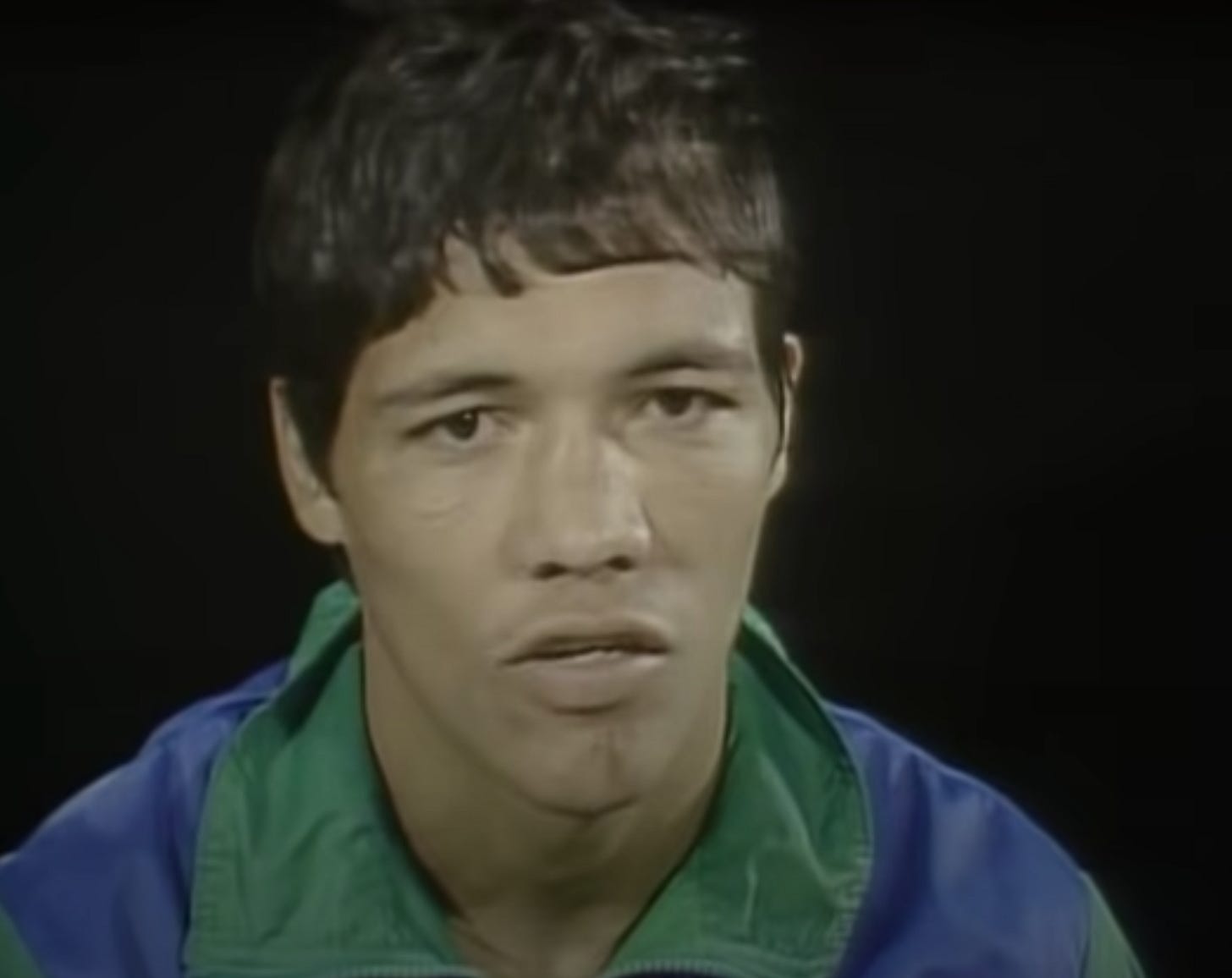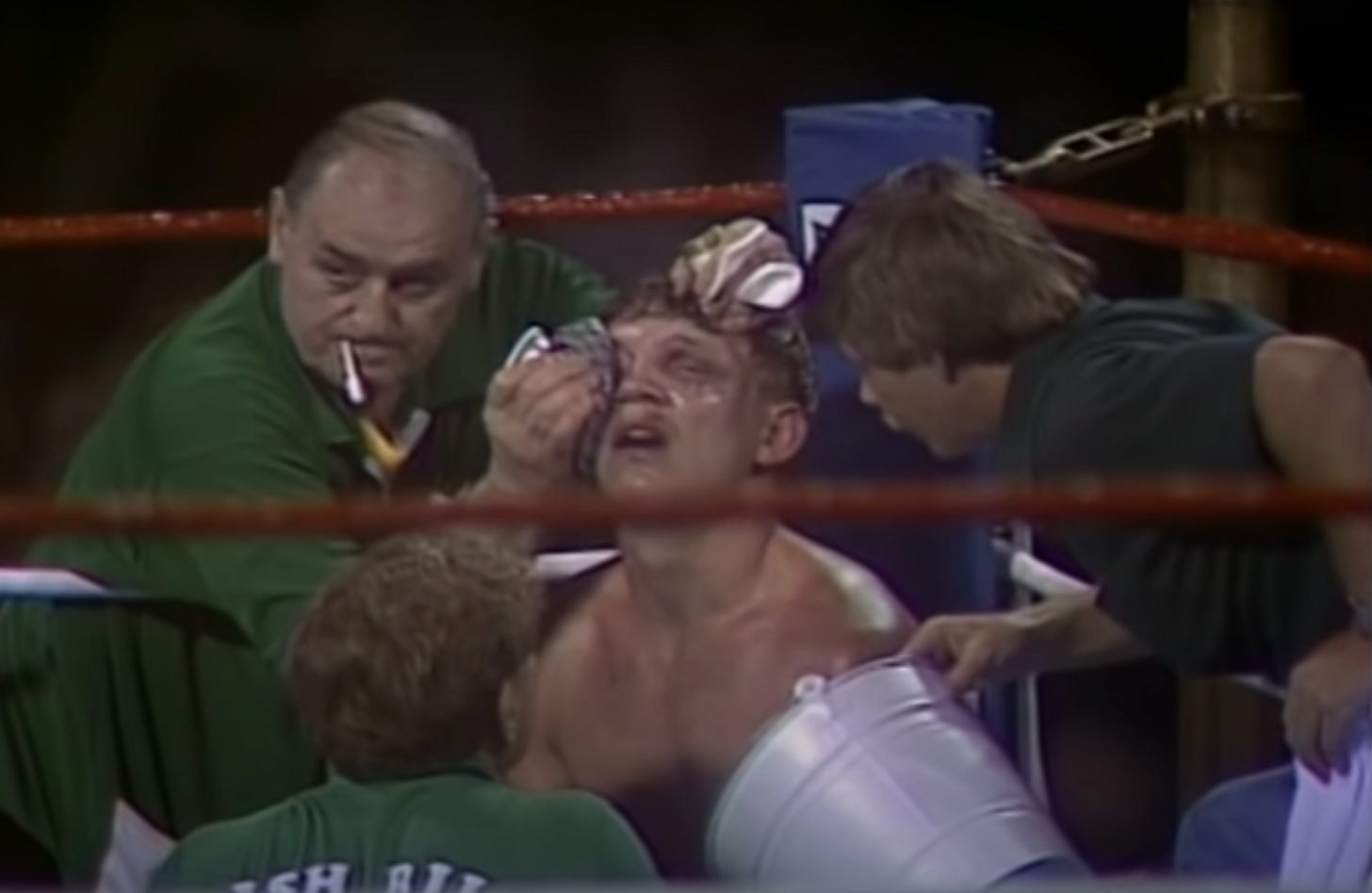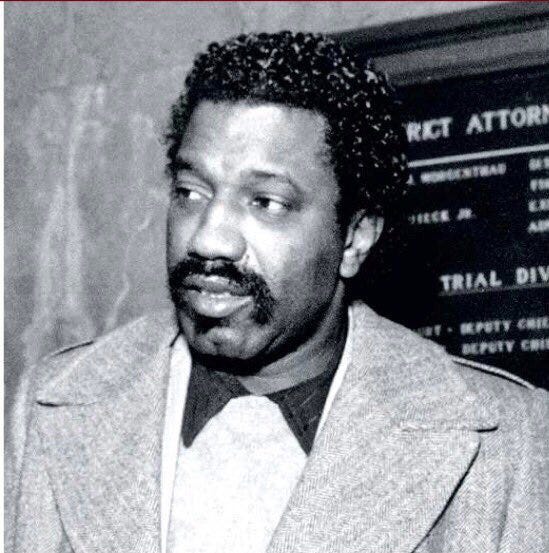Luis Resto's Heart of Darkness
The danger of living without a code
When Billy Collins Jr stepped into the ring in the middle of a sold-out Madison Square Garden in June 1983, he was a promising welterweight boxer — undefeated in 14 straight fights, winning eleven of those by knockout. Many people saw him as a serious title contender.
One year later, Collins died after crashing his car into a ditch near his hometown in Antioch, Tennessee.
Now, before you fill in the blanks, this isn’t another story of some promising young athlete who let fame get to his head and lost his way. This is the story of a man who had everything taken from him by dangerous men who had lost their moral compass.
It’s a story about what we are capable of when we do not live by a code.
Many boxing fans in the 1980s thought Billy Collins Jr could be one of the sport’s all-time greats. But when he died at just 22 years old, he was reduced to nothing more than a small paragraph in the annals of boxing history.
According to his father, the tragedy of Billy Collins Jr traced back to one life-changing fight less than a year before the crash, a fight that ended the careers of Billy Collins Jr, his opponent Luis Resto, and Resto’s trainer Carlos “Panama” Lewis.
On June 16, 1983, Collins was facing a Puerto Rican fighter from the Bronx, Resto. The fight was the undercard for a much bigger fight, Roberto “Manos de Piedra” Duran vs Davey Moore. Compared to Collins, Resto was an average fighter. He was basically considered a stepping stone to greatness. In other words, you had to beat him before people started calling you the real deal.
Collins stepped into the ring being very much the favorite. It was time to show what the hype was all about–time to show why he was undefeated. When the fight started, most fans thought Collins would make light work of Resto, maybe even knock him out. And then they’d all quickly move on to the main show, Duran vs Moore. But that’s not what happened.
To everyone’s surprise, the fight lasted for a full ten rounds. By the end of it, Collins was getting absolutely pummeled by a fighter that nobody even considered a strong puncher. He looked shell-shocked.
On the TV broadcast, the commentators even wondered if they should stop the fight seven rounds in.
“Could they stop it now? The doctor needs to look at him”, one of them said.
Before the start of the tenth round, you could hear the disoriented and badly-beaten Collins mumbling under his breath, “He’s better than me, he’s better than me,” as if already conceding defeat.
His dad wiped the blood out of his eyes and dabbed his forehead with an ice pack.
“You did good, son, you’re fighting hard out there,” Billy Collins Sr said, before the tenth round bell.
Collins stumbled through the round, miraculously staying on his feet. By the end, he looked like a complete shell of the confident and bold boxer that walked into the ring half an hour earlier. Both of his eyes were swollen shut and blood dripped down his cheeks. He would later find out that he had torn an iris, leaving him with permanently blurred vision.
The judges tallied the score and gave the victory to Resto. Turns out Billy Collins Jr wasn’t the real deal. He’d just been badly beaten by a relative nobody. It was just another upset of an overhyped young fighter. Or was it?
Resto, seemingly sportsmanlike, walked over and hugged his opponent. Then he shook hands with Resto’s cornermen including Collins Sr, who was a former professional boxer himself. Collins Sr shook Resto’s hand and then noticed something strange about his glove.
“Hold it! Hold it!” Collins Sr yells, calling over the commissioner, “All the paddings out of the damn gloves!”
When I watched this moment on video, it sent chills down my spine. You can see Collins Sr realizing what had just happened. Then Resto realized he had just been outed. He tried to get away, but Collins Sr wouldn’t let go of his glove.
“All the paddings out the damn gloves!” he shouted again.
An investigation by the New York State Athletic Commission later revealed that someone had indeed removed the padding from Resto’s gloves, making them harder and more dangerous.
That someone was Resto’s trainer, Panama Lewis.
For over two decades after the fight, Resto denied any knowledge of the glove tampering. But how could a boxer not notice the lack of padding in his gloves? That would be like a professional cyclist not realizing he’s on an e-bike. He must’ve felt the difference right?
In a 2008 documentary called Assault in the Ring, Resto admitted that he did in fact know about the gloves. And on top of that, he even said that Panama Lewis had added a layer of plaster to his hand wraps. So for ten rounds, Billy Collins Jr was essentially being punched in the face by cinder blocks. In hindsight, Collins was lucky to leave the ring alive.
Still, the fight against Resto would be Collins’s last. His vision never recovered due to the severed iris. He was forced to retire at age 22. According to his friends and family, Collins lost himself without boxing. He slipped into severe depression and alcoholism. His dad said the car crash in Antioch a year after the fight was no accident. He thought Billy was trying to end his own life.
Watching the Collins-Resto fight in its entirety, knowing what I know now, is heartbreaking. You can see Collins Jr trying to figure out what he’s doing wrong, all the while getting beat within an inch of losing his life.
In 1986, Resto and Lewis went on trial for assault, criminal possession of a weapon (the gloves) and conspiracy. Resto was sentenced to two years in prison and Lewis was sentenced to six. But none of that would bring back Billy Collins Jr.
I came across this tragic story last week while researching sports scandals for a project at work. I don’t know much about boxing but I was captivated by this story, not only because it's so devastating, but because it seems like such an acute story of good vs evil.
Watching the fight now feels like watching a Rocky Balboa movie, we know who the “good guy” is and we know who the “bad guy” is. Except in this film, the good guy loses everything.
After digging into the story a little bit, I was especially interested in the nature of the “bad guy”. What could cause an athlete to do something so heinous? I mean, cheating is one thing, but cheating in a sport where you can take someone’s life is seriously evil.
While I was reflecting on this question I remembered a book I read in high school, Joseph Conrad’s Heart of Darkness. In case you fell asleep in high school English class, it’s a story about a sailor named Charles Marlow who gets hired by a Belgian ivory company. He is sent deep into the African interior to find the mysterious Captain Kurtz, who is rumored to have gone insane and became a god-like figure to the natives. As Marlow travels deeper into Africa through this mysterious river, he becomes increasingly disturbed by the brutality he witnesses. He slowly watches his own moral decay. And when he finally meets the enigmatic Captain Kurtz, he finds a man with no morality, a man obsessed with his own power and wealth.
Heart of Darkness is a dense novel with so many interpretations and controversies. You can find thousands of essays online exploring what the story is really about, what it says about colonialism, race, human nature, psychology and much more. The story is so dreamlike–so nightmarish, rather–that whoever opens it will walk away with their own version of the story.
For me, there is one paragraph in the book that has stuck with me since I first read it over a decade ago. It’s a paragraph that might help explain how someone like Captain Kurtz or Luis Resto, could lose touch with morality.
Here is Marlow describing Kurtz:
He had taken a high seat amongst the devils of the land–I mean literally. You can't understand. How could you?–with solid pavement under your feet, surrounded by kind neighbors ready to cheer you or to fall on you, stepping delicately between the butcher and the policeman, in the holy terror of scandal and gallows and lunatic asylums–how can you imagine what particular region of the first ages a man's untrammeled feet may take him into by the way of solitude–utter solitude without a policeman–by the way of silence, utter silence, where no warning voice of a kind neighbor can be heard whispering of public opinion? These little things make all the great difference. When they are gone you must fall back upon your own innate strength, upon your own capacity for faithfulness.
This paragraph might seem poetic or ambiguous. I had to read it multiple times before I really understood what–I think–Conrad is getting at here. He’s talking about how much our own sense of morality depends on our environment. In our society, we are kept in check by the public opinion of our neighbors, the threat of the policemen, or the gallows. In other words, do we act morally because we want to, or because we are dissuaded by the threat of punishment or the negative consequences of public opinion?
I like to think that my morality is steadfast and unwavering–that I’ll do the right thing no matter what. But, to be completely candid that’s not always the case. If I’m walking in public and there are people around I’ll most likely pick up a piece of trash if I see one, but if I’m alone and I see a piece of trash, sometimes I’ll pretend I didn’t even see it. Similarly, it’s easy to maintain good habits like working out or eating healthy, but if no one is around it’s all the more tempting to hit snooze on the alarm or crush one too many beers.
Yes, I know these are pretty innocuous examples, but you get the point. Are we motivated to do the right thing only by our selfish fear of punishment or judgment from our peers?
Conrad asks us… Can we imagine what a man is capable of “by the way of solitude–utter solitude without a policeman?” without the “warning voice of a kind neighbor?”
I can’t claim to know what Luis Resto’s life was like, or even what his boxing career was like, but I can only speculate that sometime before the fight against Billy Collins Jr, Luis Resto got lost in his very own heart of darkness.
Boxing is inherently a brutal sport. The point is to beat the other guy, literally. These days there are much stricter regulations and glove inspections, but back in the 1980s it was much more wild west than it is today. No doubt, Resto and Lewis likely thought they would get away with the glove tampering.
Before the Collins fight, Panama Lewis had already walked away scot-free from a fair share of controversies, most notably as Aaron Pryor’s trainer. During the fight between Aaron Pryor and Alexis Arguello, Lewis was caught on a hot mic asking one of the cornermen to bring a very specific water bottle to Pryor.
"No, not that one, the one I mixed," Lewis was heard yelling.
Before drinking the ‘mixture’ Pryor was struggling against a dominant Arguello. After the drink, he pummeled him and won the fight by KO.
Pryor was reportedly never drug tested after the fight. And there are many speculations about what was in the water bottle, ranging from peppermint schnapps to asthma medicine all the way to cocaine.
What I mean by all this is that without a moral guide in his corner and without fear of consequences–after all, who was going to notice the missing pads in his gloves?–the moral bumpers of Resto’s environment shifted.
When he stepped into the ring on June 16, 1983, it was like Charlie Marlow venturing into the deepest parts of that mysterious river in Heart of Darkness. Morality did not exist.
All Resto could rely on was his own moral code. But, the problem is, he didn’t have one.
These days, whether in sport or in everyday life, we have more power and freedom than ever before. Technology has given us one thousand and one ways to do bad things. Now more than ever it’s important to have a clearly defined moral code.
Earlier this year, I read Rickson Gracie’s memoir, “Breathe”. Gracie is a Brazilian Jiu-Jitsu master and considered by many MMA aficionados to be the greatest fighter in the sport.
Before reading “Breathe” I knew almost nothing about Jiu-Jitsu or martial arts. Admittedly, I still don’t know much. Still, I was fascinated by Gracie’s strange but deeply spiritual modus vivendi.
Gracie, who was born in Brazil with Afro-Brazilian and Scottish ancestry, considered himself to have been a samurai in a past life. Seriously, he said he was a samurai reincarnated, and claimed to have dreams where he spoke and understood fluent Japanese.
Just like Luis Resto, Gracie lived in the fighting world, a world full of shady and morally flexible characters. Whether in a street fight with his honor on the line, or a prize fight with millions of dollars on the line, Gracie always lived by the Bushido code.
The Bushido code is the code of conduct developed by the Samurai that includes eight key virtues that every samurai is expected to uphold, no matter what. The eight principles of bushido are: justice, courage, compassion, respect, integrity, honor, loyalty, and self-control. I won’t go into all the details of Bushido, mainly because I’m not an expert in Samurai culture.
Nonetheless, the concept of living by a moral code may seem obvious, but after learning about Luis Resto and Billy Collins, I asked myself if I really do have a clearly defined moral code. And to be honest, I don’t.
My moral code comes from my environment or my religious background. I am a good person because, like Joseph Conrad says, I’m surrounded by kind neighbors, and I step “delicately between the butcher and the policeman”. In other words, I live in an environment that holds me accountable. But what if that environment changes? Will I still do the right thing?
If there’s one thing I learned from the tragedy of Luis Resto and Billy Collins Jr, it’s that a man without a code is dangerous and we cannot allow our environment to dictate our morality.
A man needs to live by a code. What’s yours?






Listened to the audio and really enjoyed this! Subscribed
Very well written. Was looking for more pages. If you have a book of your own or working on one. Please let me know.